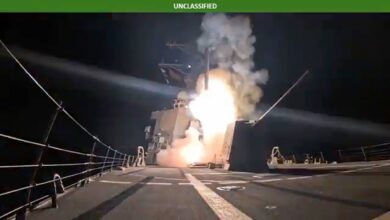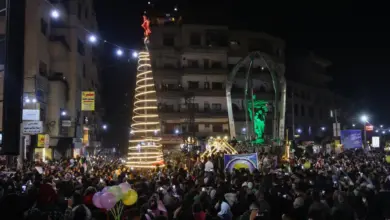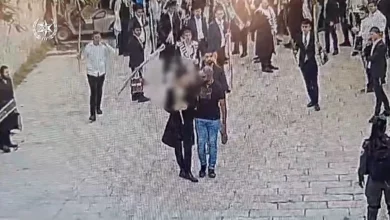International rights groups and research centers have condemned the violence that took place in the Maspero area of Cairo on Sunday, some of them laying the blame for events on Egypt's military council.
The United States Commission on International Religious Freedom (USCIRF) demanded a fair, impartial and independent investigation into the incident, and demanded that those responsible for the events be held accountable.
The group said that the Egyptian military was responsible for the violence, slamming “its use of excessive force” and accusing it of "inciting sectarianism for political gains.”
The USCIRF also demanded that part of the aid granted annually to Egypt by the US be allocated to the protection of religious minorities.
In a statement published by the group on its website, Committee Chairman Leonard Leo said, “We call on the United States to withhold a part of the military aid to Egypt, which amounts to an annual US$1.3 billion, to help secure religious minorities and their places of worship, especially those of Christians, Jews and followers of the Sufi orders.”
Leo said that the latest attack clearly demonstrates the problem of continued and unabated violence directed against religious minorities. He added that the failure to solve this problem threatens the stability of Egypt and its future.
He called on the US government to lay pressure on Egypt to ensure “a comprehensive and fair” investigation to bring those responsible to justice, which he described as being “something that was evaded while dealing with past events in Egypt”.
“The Egyptian government, which is about to hold the parliamentary elections, should immediately investigate these incidents and hold accountable those responsible, prevent any similar attacks in the future, and ensure that violence does not become a decisive turning point which moves Egypt away from the path of democracy,” said Leo.
Meanwhile, the Washington Institute for Near East Policy (WINEP) said, “The use of violence against the Coptic protesters by the military rulers of Egypt undermines their international legitimacy, and destroys their popularity locally.”
The Institute went on to describe the events as the “worst” since Mubarak stepped down.
In a report posted on its website, the institute said the recent events were a reminder of the escalating violence against the Copts, both before and after the ousting of former Egyptian President Hosni Mubarak, citing the New Year’s Eve bombing of the Two Saints Church and the Atfih and Imbaba incidents.
The Institute noted that the Egyptian authorities “manipulated the media coverage of the events to their advantage,” pointing out that Information Minister Osama Haikal “advised state media to cover the events wisely, and that Egyptian state TV responded to the advice by broadcasting reports accusing the Copts of attacking the armed forces.”
The Institute went on to say that the Supreme Council of the Armed Forces’ (SCAF) actions “gives the impression that it wishes to play a role in political life in fear that Egypt's transition towards additional democracy could lead to the elimination of its privileges”.
“The SCAF is prepared to use any means to suppress the opposition, including the incitement of sectarian violence to achieve political gains,” said the WINEP.
Meanwhile, Human Rights Watch (HRW) said an independent judicial body and not the SCAF must investigate the Maspero events. Joe Stork, deputy director of HWR’s Middle East and North Africa division said, “Once again, the military has used excessive force in dealing with protesters, and the high number of victims this time emphasizes the need for a thorough investigation and for holding accountable those responsible for the events, as well as providing the Copts with more protection.”
“The Copts are angry at the authorities’ failure to investigate and hold accountable those responsible for the violence against Christian places of worship,” said HRW. The organization went on to demand an investigation into all past incidents of violence, as well as the enactment of a law that strictly prohibits religious discrimination and allows Coptic Christians to practice their religion freely.
In related news, US Secretary of State Hillary Clinton spoke over the phone on Tuesday evening with Minister of Foreign Affairs Amr Mohamed to offer the US government’s condolences to the victims of the Maspero violence.
Ministry of Foreign Affairs spokesman Amr Rushdi said that Mohamed assured Clinton that the events “do not in any way reflect interrelationships between the various factions of the Egyptian population, which was apparent during the January revolution.”
Rushdi added that Mohamed affirmed the Egyptian government’s determination to deal with the events with the utmost seriousness and to adequately investigate the reasons and causes behind them. He added that the government set up a judicial commission to investigate all of the facts.
In a press statement on Wednesday, Rushdi said that Mohamed referred to the actions the government intends to take to ensure religious rights for all citizens, and in particular the issuance of a unified law on places of worship and a law criminalizing discrimination.
At the same time, the US Embassy in Cairo reiterated its previous denial that the United States had offered to send US troops to Egypt in order to protect Coptic places of worship.
In a strongly worded statement issued, the US Embassy in Cairo said, “We were deeply disappointed by the widespread press coverage of a purely fictitious story concerning an alleged conversation by US Secretary of State Hillary Clinton in regards to the Maspero events.”
The statement stressed that the alleged conversation “never took place, and as we mentioned in a statement on Tuesday, the United States did not offer to send troops to protect Coptic places of worship in Egypt.”
Translated from the Arabic Edition




